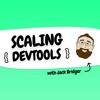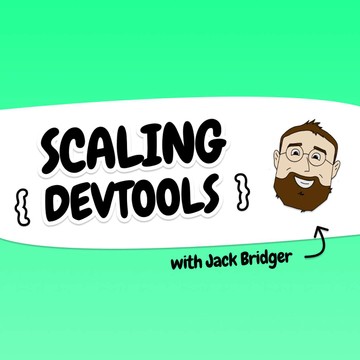

Scaling DevTools
Jack Bridger
We investigate what it takes to grow developer tools and AI DevTools. Topics include developer marketing, DevRel, developer advocacy and developer experience. Featuring founders and key people from the likes of Vercel, ElevenLabs and OpenAI. Scaling DevTools is sponsored by WorkOS.
Episodes
Mentioned books

Jan 31, 2026 • 26min
Product Market Fit - the only thing that matters
A deep dive into why market size trumps team or product when startups succeed. Discussion of how markets can pull products to success and why great products fail in weak markets. Practical signs that real product-market fit exists like explosive usage and customer pull. Tips on launching fast, iterating around customer demand, and how AI shifts PMF dynamics.

8 snips
Jan 23, 2026 • 1h 1min
Christopher Burns - creator of c15t: the developer-first cookie banner
Christopher Burns, founder of c15t and Consent.io, builds developer-first privacy tools. He discusses creating an open-source cookie banner and a cloud consent backend. Conversations cover rapid prototyping, developer-focused design, performance as a differentiator, London vs San Francisco for startups, and strategies for ethical, customizable consent experiences.

Jan 20, 2026 • 12min
The Amazon Web Services origin story (part 1)
Discover the fascinating origins of Amazon Web Services and its monumental impact on developer tools. Explore Werner Vogels' initial amazement at Amazon's scale and the early web hosting hurdles of 2004. Delve into the company's distributed systems and how rapid growth led to architectural bottlenecks. Hear about Bezos' vision for decoupling services through APIs and the lessons learned from early external partnerships. Finally, consider the strategic decisions that positioned Amazon to revolutionize cloud computing.

Jan 9, 2026 • 49min
Adam Frankl returns to answer my TAB questions
Adam Frankl, a seasoned developer-marketing leader and author, returns to discuss the essentials for DevTool startups. He emphasizes the importance of defining the right problems for developers and shares insights on Technical Advisory Boards (TABs). Adam reveals effective interview techniques to surface developer pain points and how to synthesize findings using AI. He also highlights the challenges of maintaining TAB member enthusiasm and the significance of early user feedback in shaping products. Plus, he explores innovative ways to leverage long-form content and conversations for better outreach.

Dec 31, 2025 • 41min
Kyle Cheung from Greybeam - jumping over bathroom stalls.. as marketing
Kyle Cheung, co-founder of Greybeam, dives into how his startup slashes Snowflake costs by 70-95% without migration. He shares quirky marketing tactics, including a memorable toilet stall analogy to explain query size differences. Fundraising is transformed into storytelling, where connecting with investors through narrative is key. Kyle also discusses their onboarding process and the ideal customer profiles, emphasizing the playful nature of their marketing as a way to stand out in the B2B landscape.

9 snips
Dec 19, 2025 • 49min
Matt Klein - cofounder of Bitdrift: meeting developers where they are and early days of AWS
Matt Klein, a software engineer and entrepreneur known for co-creating the Envoy proxy and founding Bitdrift, shares fascinating insights from his early days at AWS. He discusses Amazon's customer obsession and the rapid iteration culture that led to AWS's success. The conversation dives into the challenges of building Envoy at Lyft, the importance of community in open source adoption, and the complexities of spinning out Bitdrift. Klein emphasizes meeting developers where they are, adapting product strategies, and the unique on-device approach for mobile observability.

Dec 10, 2025 • 45min
“I met my cofounder while gaming” - CEO of Northflank, Will Stewart
Will Stewart, co-founder and CEO of Northflank, shares his journey from gaming to creating a developer platform that seamlessly runs complex workloads on Kubernetes. He recounts meeting his co-founder online through gaming and their unique approach to fundraising remotely. Stewart emphasizes the importance of production readiness over speed, and discusses how customer feedback shapes product development. He also dives into the balance of shipping features quickly while managing bugs, ensuring a consistent developer experience across all platforms.

17 snips
Dec 5, 2025 • 1h 4min
DevRel is unbelievably back - with swyx
Shawn 'swyx' Wang, a developer advocate and founder of the AI Engineer conference, shares his insights on the resurgent world of DevRel. He discusses his intriguing conversation with Mark Zuckerberg and Priscilla Chan about AI in biomedical research. Shawn contrasts the challenges of scaling biology with AI advancements and the crucial role of DevRel in grassroots adoption. He also addresses the pressures of the current VC investment bubble and how modern skills in short-form content are transforming the landscape.

Nov 30, 2025 • 35min
Growing Marimo's YouTube channel, with Vincent D. Warmerdam
Vincent D. Warmerdam, a Developer and DevRel practitioner behind Marimo, dives into strategies for growing a YouTube channel dedicated to their Python notebook. He discusses the power of Shorts in gaining viewers, emphasizing the need for genuine excitement about your product. Vincent shares his practical approach to content creation, balancing community outreach and SEO strategies. He insists on consistency and treating YouTube as a long game, while encouraging founders to connect authentically with their audience.

11 snips
Nov 21, 2025 • 39min
How RevenueCat tore up the sales playbook, with Rik Haandrikman
Rik Haandrikman, VP of Growth at RevenueCat, shares insights on revolutionizing sales strategies tailored for developers. He discusses how removing commission-driven incentives fosters genuine customer relationships. Rik highlights the importance of aligning sales goals with long-term success and nurturing customer lifecycles. He emphasizes the power of compelling events for driving engagement and building trust, advocating for active participation in community meetups and conferences. Discover his unique approach to make connections and inspire engineers.


